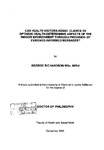CAN HEALTH VISITORS ASSIST CLIENTS TO OPTIMISE HEALTH-DETERMINING ASPECTS OF THE INDOOR ENVIRONMENT THROUGH PROVISION OF EVIDENCE-INFORMED MESSAGES?
| dc.contributor.author | RICHARDSON, GEORGE | |
| dc.contributor.other | Faculty of Health | en_US |
| dc.date.accessioned | 2013-09-10T12:10:59Z | |
| dc.date.available | 2013-09-10T12:10:59Z | |
| dc.date.issued | 2009 | |
| dc.identifier | NOT AVAILABLE | en_US |
| dc.identifier.uri | http://hdl.handle.net/10026.1/1640 | |
| dc.description.abstract |
The aim of the research was to investigate the acceptability and feasibility of health visitors working with their clients to assess health-determining aspects of their clients' home environments and to provide evidence-informed messages about the indoor environment. The research was conducted within a Soft Systems Methodology framework. Following a pilot study in 2003, a proof of concept, feasibility study was implemented (2004 to 2007) with a convenience sample of eight health visitors conducting 29 environmental assessments in clients' homes, using a dedicated, cost effective tool kit. The health visitors were trained to monitor and provide evidence-based messages on Indoor environmental quality. Their quantitative and qualitative data from the assessments were compared against a 'gold standard' assessment carried out by an indoor environmental expert. The health visitors' opinions of the concept were investigated using participant observation and face-to-face interviews. The aim and objectives of the research were met. The health visitors were able to collect accurate data. Changes to the tool kit would be needed to adapt it specifically for health visitors. The majority of the health visitors found the concept acceptable and relevant to their work. The study has added to knowledge, in that the feasibility and acceptability of health visitors helping their clients with indoor environmental problems is now more clearly understood. It confirms previous findings that home visiting health professionals are not well informed about health-determining aspects of the indoor environment. Lack of time and resources could be a barrier to health visitors participating in research. | en_US |
| dc.language.iso | en | en_US |
| dc.publisher | University of Plymouth | en_US |
| dc.title | CAN HEALTH VISITORS ASSIST CLIENTS TO OPTIMISE HEALTH-DETERMINING ASPECTS OF THE INDOOR ENVIRONMENT THROUGH PROVISION OF EVIDENCE-INFORMED MESSAGES? | en_US |
| dc.type | Thesis | |
| plymouth.version | Full version | en_US |
| dc.identifier.doi | http://dx.doi.org/10.24382/4048 |
Files in this item
This item appears in the following Collection(s)
-
01 Research Theses Main Collection
Research Theses Main


